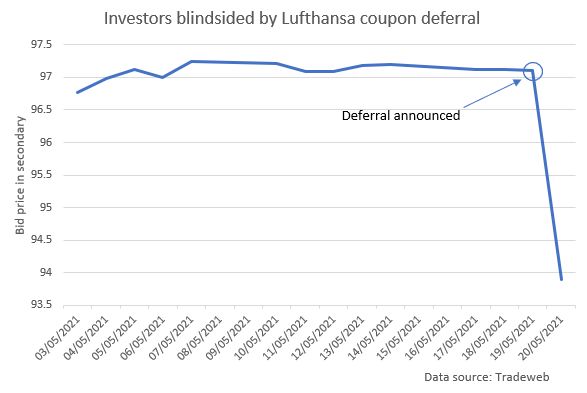German airline Lufthansa's announcement that it would be deferring the coupon on its hybrid bond took investors by surprise, sending the note down over three points in secondary on Thursday.
The company said on Wednesday that it will be forced to suspend future coupon payments on its 4.382% August 2075 hybrids - based on the view of the EU Commission that the payments violate the terms of the state aid given to Lufthansa.
The hybrid's secondary levels dropped from 97.1 to 93.9 bid after the announcement, according to Tradeweb data.
Bankers say the incident is an isolated event, with minimal read-across to other hybrid issuers. The decision was driven by the interpretation of EC rules regarding the state aid debate, and so is fairly specific to Lufthansa, one senior corporate banker pointed out.
"They have made clear that as soon as the government stabilisation measures are over they will settle the outstanding interest with investors," said the banker. "Basically, they can't reward investors with hybrid coupons while they are in receipt of state aid, as defined by the EU regulations."
In Wednesday's announcement, Lufthansa said that it intends to make up for the deferred coupon payments "as soon as possible" - which means after government stabilisation measures end.
One investor said he was surprised by the force of the hybrid's price move in secondary - pointing out that the instrument is doing exactly what it is designed to do.
"I suppose given it's because of state support being received there was an assumption that some fudge would be found," he said. "We'd certainly been nervous for a short time around whether taking furlough payments would expose UK utilities with hybrids to a similar treatment."
However, the investor said that Lufthansa's coupon payments delay was unlikely to have any impact on its future access to capital markets.
"I don't think that anyone ever really cuts themselves off from market access," he said. "Capital markets have such short memories."

Lufthansa received a €6bn bailout from the German state in June 2020, as countries around the world closed their borders and passenger numbers plummeted, causing a sharp shock to airlines. The measure was approved by the EC under the state aid Temporary Framework. Lufthansa's emergency aid package also included a €3bn government-guaranteed loan.
The Temporary Framework was introduced in March 2020, and allowed states to provide more aid to companies than is normally permitted under EC rules, with the aim of not overly distorting competition.
In May last year, the EC released new guidance saying that companies that receive state support would not be allowed to make discretionary payments - including dividends and non-mandatory coupon payments. Analysts said at the time that this might have negative implications for coupon payments on existing corporate hybrid bonds, since they are discretionary. But there was no further guidance given on the instrument.
"It is strange that it has taken the Commission so long to decide that paying the hybrid coupons is in breach of the state aid Temporary Framework," said BNP Paribas research analysts in a report published on Thursday.
They noted, however, that the decision came directly after Ryanair won a victory in court against billions of euros extended in state aid to rivals KLM and Portugal's TAP, on the grounds that regulators had failed to justify the huge cash injections.
Ryanair has filed a total of 16 lawsuits against the EC for allowing state aid to individual airlines - including an ongoing challenge to Lufthansa's bailout.
No read across
Still, there are unlikely to be any direct implications for other state-owned issuers of hybrids as no other current issuers have received emergency state aid, said BNP Paribas analysts. Deutsche Bahn's potential capital injection is not expected to be under the EC's Temporary Framework, they said.
Hybrid bonds issued by airlines bore the brunt of the sell-off in March 2020, as the structure allows borrowers to skip coupon payments or extend that debt without it being a default. Such bonds dropped up to 20 points in the peak of the market turmoil last year.
Such coupon deferrals are rare, but not unheard of. A small number of hybrid issuers include "mandatory coupon deferral clauses", which are triggered if a certain credit ratio is breached.
Suedzucker said in 2019 that it would skip coupons on its €700m 2.791% perpetual callable June 2019 floater after world sugar prices dropped to the lowest levels for a decade, leading the company to issue several profit warnings.
And Swiss baker and McDonald's hamburger buns maker Aryzta deferred a hybrid coupon payment in 2017. The company had been struggling with soaring grain prices after a heatwave in Europe, leading it to issue several profit warnings.